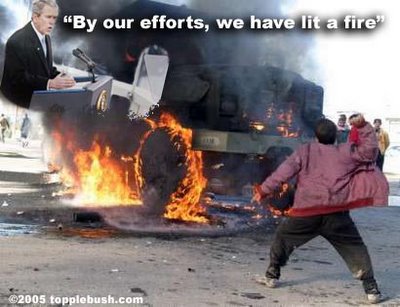Bush: Hold Me Accountable for Outcome in Iraq
No not we, you lit a fire, and I do hold you accountable
 Bush: Hold Me Accountable for Outcome in Iraq
Bush: Hold Me Accountable for Outcome in IraqBut Mr. Bush repeatedly refused to speak about what he called hypotheticals -- such as when U.S. troops may leave the country. But he did touch on the issue.
"Americans have no intention of taking sides in a sectarian struggle or standing in the crossfire between rival factions," the president said.
After expressing his confidence in the Iraqi government and in his own Cabinet, President Bush was asked about accountability in Iraq -- and who would be held responsible if the war plan fails.
"It's what the 2004 campaign was about," President Bush said. "If people want to -- if people are unhappy about it, look right to the president."
Rival Militias Threaten Iraq's South
The intensifying battle between Iraq's strongest Shiite militias - the Mahdi Army and Badr Brigades - threatens to destabilize Iraq's oil-rich south and compound chaos in the capital. The outcome also could decide whether Iraq stays whole or breaks up.
Despite repeated vows to crush the militias, Prime Minister Nouri al-Maliki has resisted U.S. pressure to move against the groups and their roaming deaths squads because he draws most of his support from the politicians who run them.
The Mahdi Army and Badr Brigades have repeatedly clashed since the 2003 overthrow of Saddam Hussein, most recently in the southern city of Amarah. Mahdi militiamen briefly took control of the city this month and fought gunbattles with the Badr Brigades-dominated police that killed 31 and wounded dozens.
"That was the worst time we had to go through in the city," said Abdul-Hussein Adnan, a 37-year-old teacher from Amarah. "Given the high number of casualties and the tribal nature of the city, I expect things to get worse. It's impossible in Amarah for someone to be killed and his killers not hunted down and killed in revenge."
LinkHere





0 Comments:
Post a Comment
<< Home